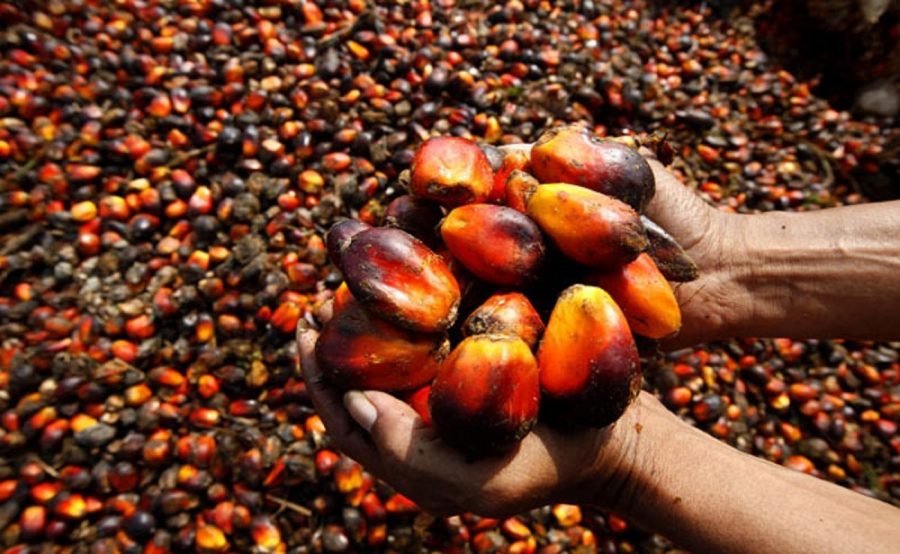At a local market in Mpape, Abuja, Ugo Chibuike, a local vendor, carefully pours oil from a 25-litre jerrycan into a smaller jug, filling empty water bottles with the bright red liquid and stacking them neatly on a wooden shelf.
“When we began this business twelve years ago, everything was difficult,” he says, wiping his oily hands on a rag. “Now, we have better ways to sell, but it’s still a daily hustle to make ends meet.”
“Still, our quantity and prices cannot match imported oil.” The nostalgia expressed by Ugo captures the paradox of Nigeria’s palm oil industry—a once-thriving sector now facing a reluctant death.
A season of palm oil boom
Between the 1950s and the 1970s, Nigeria was the world’s largest exporter of palm oil, producing more than 40 percent of the global supply.
The country’s palm belt spanned from Edo to Cross River. Everything changed, however, in the 1970s, following the oil boom. The government’s exclusive focus on oil revenue caused many agricultural exports, including palm oil, to decline out of neglect.
The Nigerian Civil War (1967-1970) further hastened the decline. Many plantations in the Southeast and South-South, where production was strongest, were destroyed, with surviving farms relying on wild groves rather than structured plantations.
A monumental fall from grace
Today, with its share of global palm oil production falling to less than 2%, Nigeria’s premier position has been overtaken by Southeast Asia, which accounts for over 80% of the world’s share.
To make up for the shortfall, the country spends roughly 600 million dollars on palm-oil exports each year, according to the National Palm Produce Association of Nigeria.
Experts credit this monumental decline to industrialisation.
While Nigeria clung to traditional processing, countries like Malaysia and Indonesia adopted plantation-based models, establishing modern refineries and turning research into large-scale industrial productivity.
The National Palm Produce Association of Nigeria estimates that the industry could make over $20 billion annually, along with millions of jobs, if industrialised.
Reviving a declining industry
A fresh wave of interventions is emerging. The Central Bank of Nigeria launched the Oil Palm Development Initiative in 2019.
The programme targeted 100,000 hectares of new plantations in the short term and 500,000 hectares in the long term, providing long-term loans for smallholders and commercial farmers.
The scheme featured eleven states across the South-South and South-East, and private companies such as Presco Plc, Okomu Oil Palm Plc and Okitipupa Oil Palm Ltd as anchor partners.
Recently, Okitipupa started replanting a million hybrid seedlings and established four new processing plants in Ondo State to enhance productivity.
In states like Edo and Akwa Ibom, government initiatives such as the Edo State Oil Palm Programme, or ESOPP, and the Ibom Green Economy initiative have been rolled out to enhance the industry.
ESOPP, particularly, has adopted 70,000 hectares for palm cultivation, employing hybrid high-yielding breed seedlings, which immediately double oil production per hectare.
JB Farms in Ondo State has acquired 10,000 hectares, with the state government issuing ₦2 billion in loans to local farmers.
Meanwhile, the “supergene” hybrids are now increasingly employed in farming, while digital-traceability tools to allow farmers qualify for international export markets are now being embraced.
Weak infrastructure and high logistics
Despite these efforts, infrastructure remains weak and transport costs often swallow profits. “To move oil from Enugu to Abuja costs almost as much as my profit,” Chibuike says.
Many plantations are older than 40 years. Replanting takes at least three years before maturity.
Most smallholders prefer manual refining to retain control over by-products like palm kernel shells and fibre. But crude refining is inefficient and reduces overall quality.
Experts stress that aligning production scale with modern sustainability practices is essential.
“Our palm oil can compete globally, but until we standardise processing, improve traceability, and support smallholders, export growth will remain limited,” explains Segun Emmanuel, an agribusiness expert.
Lesons from global practices
There are tons of lessons to draw from thriving producers. For instance, Indonesia’s Palm Oil Plantation Fund Management Agency and Malaysia’s Palm Oil Board coordinate research, smallholder support and export promotion.
Ghana has also established a framework to regulate and promote key export crops, including palm oil.
Experts reckon that Nigeria could benefit from establishing a national palm oil board to streamline operations, regulate quality and promote exports.
Coordinated investment and transitioning to modern processing could bridge the gap between current production and export potential.
Ugo Chibuike, the Mpape trader, embodies this optimism. “One day, this oil will be exported again, not imported. That’s when we’ll truly see Nigeria back in the game.”
Summary not available at this time.






